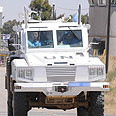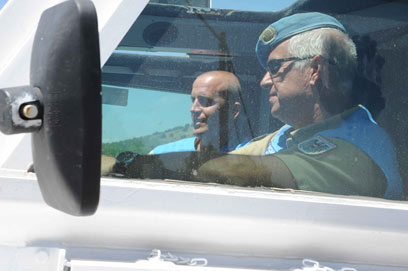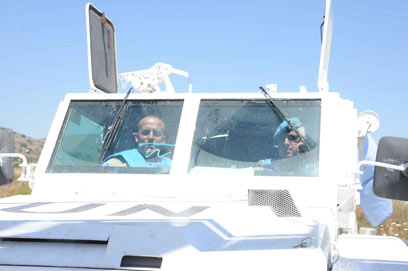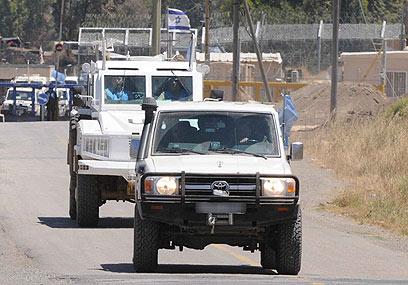
Austria pulls out Golan Heights troops
Austrian peacekeeping troops patrolling the Golan Heights withdraw to Israeli territory ahead of flying home; 'We took over a different mandate, which fitted a neutral country,' Austrian FM defends decision
Austria has begun withdrawing peacekeepers from the Golan Heights, winding down a four-decade mission due to spillover fighting from the Syrian civil war, the defense ministry said.
A Reuters journalist in the Golan said Austrian troops had already moved from the Quneitra crossing point to a United Nations base inside the Israeli-held part of the heights on Tuesday.
Related stories:
- Philippines considering Golan pullout
- Putin: Russia can replace Austria in UN Golan monitoring force
- US demands Hezbollah pull out fighters from Syria
"The first 60 to 80 soldiers will land in Vienna tomorrow afternoon, so you can already see the withdrawal on site," Defense Ministry spokesman Andreas Strobl told Reuters in Vienna.
(Video: Ido Beker)

Quneitra crossing, Tuesday (Photo: Avihu Shapira)

(Photo: Avihu Shapira)

(Photo: Avihu Shapira)
United Nations Disengagement Observer Force (UNDOF) troops left behind, most of them from Chile and India, were doubtful the tense situation will improve.
"I'm alive, but the reality is there's an escalation, and we're stuck in the middle," a UNDOF soldier said.
The Austrian troops mounting the vehicles, ready to depart amid mountains of bags and equipment, refused to answer reporters' questions.
"I have no idea why the Austrians are leaving and I can't speak for them," said a Chilean soldier. "Every country is concerned for its troops' safety in the region. The situation in Syria may be not as bad as CNN or Al-Jazeera portray, but it's still not as good as you might be led to think," he added.
The soldier, who has been stationed in Syrian territory for the past six months, stressed the mandate given to the UN will have to change.
"We cannot intervene," he said. "We report violations by the Syrians or the Israelis, that's it. I think this must change. I only have my hands and my weapons to defend myself," he emphasized.
The Austrians have patrolled the buffer zone between Israel and Syria as part of the UNDOF since it was set up in 1974.
The Vienna government said last week it would pull out after worsening fighting between Syrian rebels and government forces sent its soldiers running for cover.
Two soldiers were wounded last week after Syrian rebels captured a border post then were driven out by government troops.
Foreign Minister Michael Spindelegger said Austria would now negotiate with the United Nations about an orderly handover to the next contingent, "if there is one", but reserved the right to stick to its timetable for a full exit within four weeks.
Tough spot
Russia has offered to replace Austria in the Golan Heights, which were captured by Israel in the 1967 War, but the United Nations turned down the offer because the agreement with Israel and Syria precludes permanent members of the UN Security Council from taking part.
Chancellor Werner Faymann defended neutral Austria's decision to withdraw from Golan, where its roughly 380 soldiers make up the biggest contingent in the 1,000-strong force.
"We never could have and would never have wanted to take on a military mission to mediate or intervene between the opposition rebels and governmental troops," he told reporters after the government's weekly cabinet meeting.
"We took over a different mandate, which was appropriate for a neutral country."
He denied that Austria, which also has peacekeeping troops in hot spots including Lebanon, Kosovo and Bosnia, would suffer in international stature from the move.
Prime Minister Benjamin Netanyahu referred earlier this week to the pullouts and linked them to the negotiations with the Palestinians.
"The disintegration of the UN force in the Golan stresses the fact Israel cannot charge its security with international forces. They can be part of the arrangements, but they cannot be the only crutch on which Israel's security leans," he said in a cabinet meeting.
Reuters contributed to this report
- Receive Ynetnews updates directly to your desktop











